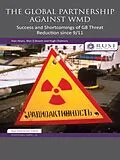Based on extensive primary research, this Whitehall Paper assesses the success and shortcomings to date of the Global Partnership, and suggests how the mechanism can be bolstered and taken forward.
Autorentext
Alan Heyes, Wyn Q Bowen, Hugh Chalmers
Zusammenfassung
The 9/11 terrorist attacks prompted a new urgency in efforts to deal with chemical, biological, radiological and nuclear proliferati on. The potential acquisition and use by terrorist groups of such weaponry was suddenly a much increased threat. The G8 Global Partnership against the Spread of Weapons and Materials of Mass Destruction subsequently encouraged some twenty-two countries and the European Union to pledge up to $20 billion to address this challenge. The creation of the Global Partnership was the first time so many countries agreed to collaborate on a range of non-proliferation, security and nuclear safety programmes, as well as commit such an amount of resources to them. Based on extensive primary research, this Whitehall Paper assesses the success and shortcomings to date of the Global Partnership, and suggests how the mechanism can be bolstered and taken forward.
Inhalt
Chapter 1 Introduction; Chapter 2 The G8, Non-Proliferation and the Global Part nership; Chapter 3 Funding, Prioritisation, Results and Evaluation; Chapter 4 Operational Delivery and Spin-Off Benefits; Chapter 5 The Future of Multilateral Threat Reduction;
Titel
The Global Partnership Against WMD
Untertitel
Success and Shortcomings of G8 Threat Reduction since 9/11
EAN
9781136217555
ISBN
978-1-136-21755-5
Format
E-Book (epub)
Hersteller
Herausgeber
Genre
Veröffentlichung
21.08.2012
Digitaler Kopierschutz
Adobe-DRM
Dateigrösse
1.15 MB
Anzahl Seiten
160
Jahr
2012
Untertitel
Englisch
Unerwartete Verzögerung
Ups, ein Fehler ist aufgetreten. Bitte versuchen Sie es später noch einmal.
